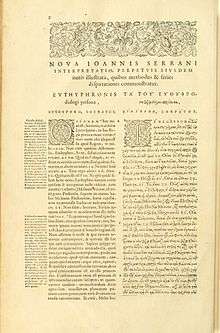Euthyphro (prophet)
Euthyphro of Prospalta (/ˈjuːθɪfroʊ/; Ancient Greek: Εὐθύφρων Προσπάλτιος; fl. 400 BCE) was an ancient Athenian religious prophet (mantis) best known for his role in his eponymous dialogue written by the philosopher Plato. The debate between Euthyphro and Socrates therein influenced generations of theologians and gave rise to the question of the relationship between God and morality known as the Euthyphro dilemma.
Life

Euthyphro's biography can be reconstructed only through the details revealed by Plato in the Euthyphro and Cratylus, as no further contemporaneous sources exist.[1] While the dramatic date of the former may be definitively set at 399 BCE,[1] the latter is uncertain, argued alternately as 422[1] and 399;[2] this makes gauging Euthyphro's period of activity difficult, but the former dating paradigm suggests that he may have been a long-lived figure in Athens. He was an Athenian citizen of the Prospalta deme old enough to have appeared multiple times before the Athenian assembly in 399, placing his birth somewhere in the mid-5th century.[1] Euthyphro had evidently farmed on Naxos,[3] probably as part of the cleruchy established by Pericles in 447 to which his father may have belonged.[1] If in fact historical, the trial he instigated against his father depicted in the Euthyphro may have begun as early as 404.[4]
Euthyphro's status as a "mantic" seer is supported by both texts. Although Socrates seems to treat this faculty with ironic disdain, he never criticizes it openly.[1] Both dialogues attest to Euthyphro's particular interest in father-gods such as Uranus, Cronus and Zeus,[1][5][6] and Socrates accredits Euthyphro with igniting deep inspiration during the etymological exercise he embarks upon in the Cratylus.
Legacy
While little remains of Euthyphro's life, his depiction in Plato sparked interest in many generations of scholars and commentators. Diogenes Laërtius depicts him as being swayed away from the prosecution of his father following the aporia demonstrated in his eponymous dialogue.[7] Inspired by this aporia, the Euthyphro dilemma arose within antiquity and was revived by Ralph Cudworth and Samuel Clarke in the 17th and 18th centuries,[8] remaining relevant in theological and philosophical discussions for centuries thereafter.
References
- Debra Nails, The people of Plato: a prosopography of Plato and other Socratics. Indianapolis: Hackett Publishing, 2002; pg. 152.
- John Sallis, Being and Logos, University of Indiana Press, 1997; pg. 230.
- Plato, Euthyphro, 4c
- John Burnet, Plato's Euthyphro, Apology and Crito. Oxford: Clarendon, 1924
- Plato, Cratylus, 396b
- Plato, Euthyphro, 5e
- Diogenes Laërtius, 2.29
- Terence Irwin, "Socrates and Euthyphro: The Argument and its Revival" (2006)